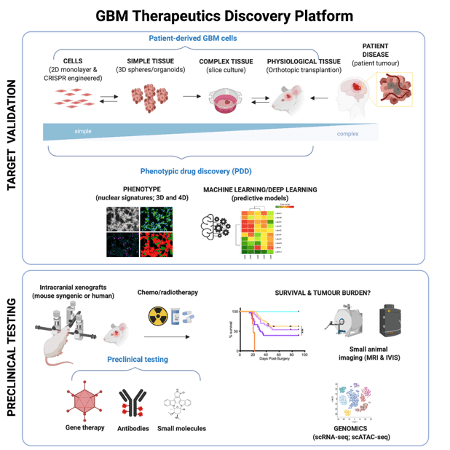Outcomes for patients with glioblastoma (GBM) remain dismal despite recent improvements in our fundamental understanding of the recurrent genomic disruptions driving tumorigenesis. The repeated failure of new treatments to improve survival, despite promising pre-clinical data, highlights serious flaws in existing drug development pipelines. The need for deeper understanding of GBM biology and more informative and relevant pre-clinical models is stark. GBM research in Edinburgh and Glasgow has massively expanded over the past 5 years, delivering many basic discoveries and key translational infrastructure. Through the Brain Tumour Centre of Excellence (CoE; joint with UCL; led by Frame for Edinburgh), we are building a new multi-disciplinary GBM research community in science and clinic.
We will now capitalize on strengths in mouse and patient-derived GBM modelling, human sampling, biology and translation, to form a new ‘GBM therapeutics discovery platform’. Our vision is to accelerate pre-clinical testing of new therapies (small molecule, biologicals, and gene therapies, drug-drug and radiation-drug combinations) across a range of disease-relevant GBM models. This builds upon the CRUK-funded Accelerator (led by Pollard) and other CRUK-funded programmes, such as the CRUK RadNet Centre Glasgow (with some focus on GBM; led by Chalmers). The GTDP platform will extend beyond small animal pre-clinical data, guiding biomarker-driven combinations and smart clinical trial design that build on standard-of-care. The CRUK-funded GBM programmes in Edinburgh and Glasgow will prime the acceleration of translation via the new GTDP that will serve all GBM researchers in Edinburgh and Glasgow, and at UCL, and enhance wider partnerships in academia and industry and will ultimately improve outcomes for patients.

Breakthroughs in GBM treatment will come from translating a much deeper understanding of GBM biology. Our CRUK-funded research into GBM biology is revealing numerous targets and opportunities for translation in pathways associated with stem cell-associated pathways (Pollard), radiation responses (Chalmers), integrin adhesion signalling (Frame, Brunton), autophagic degradation (Gammoh) and the early stages of gliomagenesis (Sieger) . Many targets and biology-based phenotypic assays are ripe for onward translation and are at various stages of exploitation (often in partnerships with industry) or via our drug discovery Brain Tumour Award (Carragher, Frame). Our translational biology studies critically require pre-clinical testing in the models being developed.